Posted November 19, 2023 by Nicky in Reviews / 0 Comments
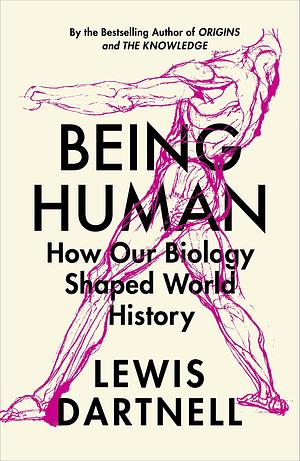
Being Human: How Our Biology Shaped World History
Genres: History,
Non-fiction,
Science Pages: 368
Rating: 
Synopsis: We are a wonder of evolution. Powerful yet dextrous, instinctive yet thoughtful, we are expert communicators and innovators. Our exceptional abilities have created the civilisation we know today.
But we're also deeply flawed. Our bodies break, choke and fail, whether we're kings or peasants. Diseases thwart our boldest plans. Our psychological biases have been at the root of terrible decisions in both war and peacetime.
This extraordinary contradiction is the essence of what it means to be human - the sum total of our frailties and our faculties. And history has played out in the balance between them. Now, for the first time, Lewis Dartnell tells our story through the lens of this unique, capricious and fragile nature. He explores how our biology has shaped our relationships, our societies, our economies and our wars, and how it continues to challenge and define our progress.
Lewis Dartnell’s Being Human was okay, but not too surprising for me: it explores the links between our biological constraints (such as our immune systems and adaptive immunity) and historical events (such as the enslavement of millions because white people had no immunity to various diseases and thus were dying).
It discusses some other types of issue, such as cognitive biases, and briefly gestures toward mismatch theory… but mostly it skims over each topic, and doesn’t feel like it goes into depth on anything. The incidents chosen are illustrative rather than exhaustive, so it’s usually an idea, one example, and then move on.
I didn’t notice any glaring errors where it concerned things I know, but I think it rather lightly touched on most things, so there weren’t major opportunities for it to go wrong.
Rating: 3/5
Tags: book reviews, books, history, Lewis Dartnell, non-fiction, science
Posted November 12, 2023 by Nicky in Reviews / 0 Comments
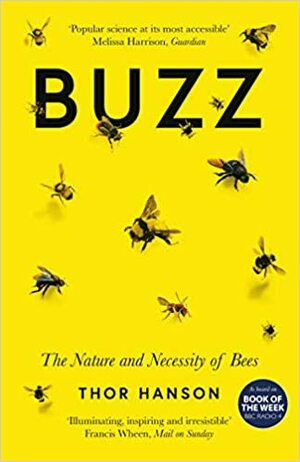
Buzz: The Nature and Necessity of Bees
Genres: Non-fiction,
Science Pages: 304
Rating: 
Synopsis: In Buzz, the award-winning author of Feathers and The Triumph of Seeds takes us on a journey that begins 125 million years ago, when a wasp first dared to feed pollen to its young.
From honeybees and bumbles to lesser-known diggers, miners, leafcutters, and masons, bees have long been central to our harvests, our mythologies, and our very existence. They've given us sweetness and light, the beauty of flowers, and as much as a third of the foodstuffs we eat. And, alarmingly, they are at risk of disappearing.
As informative and enchanting as the waggle dance of a honeybee, Buzz shows us why all bees are wonders to celebrate and protect.
Thor Hanson’s style is quite enjoyable — conversational, personal, but usually to the point. We’ll see some scraps of his family life as he talks about making experiments with his son, for example, but it doesn’t veer off into three pages of some scenario about a mid-life crisis and turning to bees or something like that (which can be a bit of a hazard with books of this genre). Mostly, he’s focused on the bees, and his enthusiasm for the bees.
I actually didn’t know much about any type of bees other than honeybees, so I really enjoyed hearing about sweat bees and alkali bees and learning a bit more about bumblebees and their tiny amount of honey.
Of course he also addresses colony collapse disorder, and the general decline of bee species worldwide, with some room for hope and some much-needed warning. Bees are just “cute” enough that I hope humans are going to come through for them.
Rating: 4/5
Tags: book reviews, books, non-fiction, science, Thor Hanson
Posted November 9, 2023 by Nicky in Reviews / 0 Comments
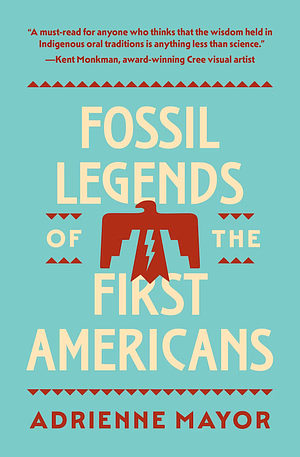
Fossil Legends of the First Americans
Genres: History,
Non-fiction,
Science Pages: 488
Rating: 
Synopsis: The burnt-red badlands of Montana's Hell Creek are a vast graveyard of the Cretaceous dinosaurs that lived 68 million years ago. Those hills were, much later, also home to the Sioux, the Crows, and the Blackfeet, the first people to encounter the dinosaur fossils exposed by the elements. What did Native Americans make of these stone skeletons, and how did they explain the teeth and claws of gargantuan animals no one had seen alive? Did they speculate about their deaths? Did they collect fossils?
Beginning in the East, with its Ice Age monsters, and ending in the West, where dinosaurs lived and died, this richly illustrated and elegantly written book examines the discoveries of enormous bones and uses of fossils for medicine, hunting magic, and spells. Well before Columbus, Native Americans observed the mysterious petrified remains of extinct creatures and sought to understand their transformation to stone. In perceptive creation stories, they visualized the remains of extinct mammoths, dinosaurs, pterosaurs, and marine creatures as Monster Bears, Giant Lizards, Thunder Birds, and Water Monsters. Their insights, some so sophisticated that they anticipate modern scientific theories, were passed down in oral histories over many centuries.
Drawing on historical sources, archaeology, traditional accounts, and extensive personal interviews, Adrienne Mayor takes us from Aztec and Inca fossil tales to the traditions of the Iroquois, Navajos, Apaches, Cheyennes, and Pawnees.
Fossil Legends of the First Americans felt a bit… slower than Mayor’s book on the fossil knowledge of Greek and Roman culture. In part, it’s because there’s just more ground to cover, but also there’s a certain repetitiveness to each chapter in her gradual survey of the whole area.
I do see her point that these indigenous peoples definitely interacted with fossil bones, and definitely came to an understanding of them — seeing them as evidence of deep time, and even perhaps a form of evolution — but sometimes (as with the other book) it feels like grasping at straws. “Perhaps” they thought this or that, but we can’t know that. So much knowledge has been lost, and so much is kept by indigenous communities and not shared with white people (for good reason).
It’s an interesting survey of attitudes toward fossils and stories about fossils in indigenous American cultures, but that’s as far as it can go.
Rating: 3/5
Tags: Adrienne Mayor, book reviews, books, history, non-fiction, science
Posted November 6, 2023 by Nicky in Reviews / 3 Comments

For the Love of Mars
Genres: History,
Non-fiction,
Science Pages: 247
Rating: 
Synopsis: Mars and its secrets have fascinated and mystified humans since ancient times. Due to its vivid color and visibility, its geologic kinship with Earth, and its potential as our best hope for settlemen, Mars embodies everything that inspires us about space and exploration. For the Love of Mars journeys through the red planet's place in the human imagination, beginning with ancient astrologers and skywatchers and ending in our present moment of exploration and virtual engagement.
This book isn’t really about the science of Mars — though that comes into it — but is more of a cultural history: an attempt to understand what Mars has meant to people, the framework in which people have understood it in different ages, and how that has shaped how we understand Mars now and the kind of assumptions we hold about it.
I found it a surprisingly slow read for the length, comparatively speaking; it was perhaps a bit drier than I expected for a book about Mars (which just goes to show how we think about Mars, I suppose), and spent rather a long time recounting the stories that people told about Mars, e.g. a detailed explanation of Dante’s Paradiso.
I did expect a cultural history from the blurb (though it seems other people were misled), but I suppose I’d expected something focusing more on the modern part of it. I did really enjoy the chapter that discusses the Mars rovers and people’s intense, surprisingly emotional reactions to them.
Rating: 3/5
Tags: book reviews, books, history, Matthew Shindell, non-fiction, science
Posted November 4, 2023 by Nicky in Reviews / 3 Comments
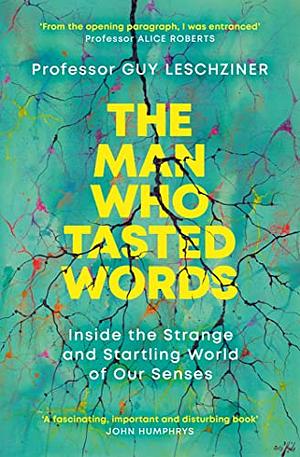
The Man Who Tasted Words
Genres: Non-fiction,
Science Pages: 326
Rating: 
Synopsis: Vision, hearing, taste, smell, and touch are what we rely on to perceive the reality of our world. Our senses are the conduits that bring us the scent of a freshly brewed cup of coffee or the notes of a favorite song suddenly playing on the radio. But are they really that reliable? The Man Who Tasted Words shows that what we perceive to be absolute truths of the world around us is actually a complex internal reconstruction by our minds and nervous systems. The translation into experiences with conscious meaning—the pattern of light and dark on the retina that is transformed into the face of a loved one, for instance—is a process that is invisible, undetected by ourselves and, in most cases, completely out of our control.
In The Man Who Tasted Words, neurologist Guy Leschziner explores how our nervous systems define our worlds and how we can, in fact, be victims of falsehoods perpetrated by our own brains. In his moving and lyrical chronicles of lives turned upside down by a disruption in one or more of their five senses, he introduces readers to extraordinary individuals, like one man who actually “tasted” words, and shows us how sensory disruptions like that have played havoc, not only with their view of the world, but with their relationships as well. The cases Leschziner shares are extreme, but they are also human, and teach us how our lives and what we perceive as reality are both ultimately defined by the complexities of our nervous systems.
The Man Who Tasted Words sounds like it’s going to be about a lexical->gustatory synaesthete, and the blurb also calls out that part, so I just want to say up front that it’s not really like that. There’s one chapter that discusses synaesthesia, and it doesn’t give it an especially long consideration or something.
In the end, it’s a book in the vein of many other similar books: the author’s a neurologist, and he draws stories from his practice to illustrate how the brain works, and how it fails to work. It’s always fascinating to read that kind of thing, but at the same time, this isn’t new at all. It has all the predictable beats (here’s the patient he failed, here’s the worst thing he’s ever experienced as a doctor, here’s the fascinating case), and the stories don’t particularly illustrate anything surprising and new.
So if you don’t read a lot of these, or conversely if you absolutely love them and read every single one you can get your hands on, this might be worth some time. I thought it was just OK, though.
Rating: 3/5
Tags: book reviews, books, Guy Leschziner, non-fiction, science
Posted November 1, 2023 by Nicky in Reviews / 1 Comment
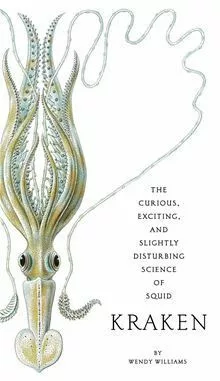
Kraken: The Curious, Exciting, and Slightly Disturbing Science of Squid
Genres: Non-fiction,
Science Pages: 223
Rating: 
Synopsis: Kraken is the traditional name for gigantic sea monsters, and this book introduces one of the most charismatic, enigmatic, and curious inhabitants of the sea: the squid. The pages take the reader on a wild narrative ride through the world of squid science and adventure, along the way addressing some riddles about what intelligence is, and what monsters lie in the deep. In addition to squid, both giant and otherwise, Kraken examines other equally enthralling cephalopods, including the octopus and the cuttlefish, and explores their otherworldly abilities, such as camouflage and bioluminescence.
Kraken was okay, but I felt the lack of numbered footnotes and felt it was all pretty slight, relying on personal interview and recounting of encounters between people and squid, rather than focusing on squid directly. There are endnotes with a few pages of sources, but it’s impossible to match up anything said in a specific chapter with the sources, which are just alphabetised.
It’s pretty readable, and there are some interesting anecdotes, but it feels like the author didn’t really had enough material — even padding out the book with a chapter on octopodes, instead of staying focused on squid. (Of course they are related, but the chapter wasn’t about the similarities/differences so much, just spent time describing a specific encounter with an octopus and such.)
So overall, it was okay, and there was some new-to-me information, but… ultimately, nothing too surprising, and no moments where I wanted to turn to someone and say “hey, did you know…?”
Rating: 2/5
Tags: book reviews, books, non-fiction, science, Wendy Williams
Posted October 31, 2023 by Nicky in Reviews / 0 Comments

A History of the Roman Empire in 21 Women
Genres: History,
Non-fiction Pages: 336
Rating: 
Synopsis: Here’s how the history of the Roman Empire usually goes… We start with Romulus, go on to Brutus overthrowing Tarquin, bounce through an appallingly tedious list of battles and generals and consuls, before emerging into the political stab-fest of the late Republic. From there, it runs through all the emperors, occasionally mentioning a wife or mother to show how bad things get when women get out of control, until Constantine invents Christianity and then Attila the Hun comes and ruins everything. But the history of Rome and empire is so much more than these Important Things.
In this alternative history, Emma Southon traces the story of the Roman Empire through women: Vestal Virgins and sex workers, business owners and poets, martyrs and saints. Each gives a different perspective on women’s lives and how they changed, across time and across class lines.
Received to review via Netgalley
Emma Southon has a particular style that I imagine some people really hate: conversational, chatty, often even flippant. When she doesn’t know something, because no one knows, she says so. When she’s painting a picture from imagination to fill in the gaps, or choosing one interpretation of many, she says so very frankly. I find it very readable, and I appreciate how clear she is about when she’s using sources, how she’s using sources, and when she’s just having to make things up — or choose one option above others because there’s nothing particular to tell them apart. She’s interested in telling a story here, and it shows.
That said, I can understand why those who are just looking for facts would rather she stop it; for all that she’s clear about sources vs imagination, it’s really not formalised. Don’t let that fool you, though: there’s an extensive bibliography at the back.
I really liked Southon’s plan to discuss events through women: I was kind of surprised Livia wasn’t a choice, for example, or Cleopatra, or Agrippina (who Southon has written a whole biography of!) — but instead Southon makes a harder decision, and often picks less well-known women.
I found it really enjoyable, though I still prefer her book on murder in Ancient Rome.
Rating: 4/5
Tags: book reviews, books, Emma Southon, history, non-fiction
Posted October 28, 2023 by Nicky in Reviews / 0 Comments

Hurricane Lizards and Plastic Squid
Genres: Non-fiction,
Science Pages: 304
Rating: 
Synopsis: In Hurricane Lizards and Plastic Squid, biologist Thor Hanson tells the remarkable story of how plants and animals are responding to climate change: adjusting, evolving, and sometimes dying out. Anole lizards have grown larger toe pads, to grip more tightly in frequent hurricanes. Warm waters cause the development of Humboldt squid to alter so dramatically that fishermen mistake them for different species. Brown pelicans move north, and long-spined sea urchins south, to find cooler homes. And when coral reefs sicken, they leave no territory worth fighting for, so aggressive butterfly fish transform instantly into pacifists.
A story of hope, resilience, and risk, Hurricane Lizards and Plastic Squid is natural history for readers of Bernd Heinrich, Robin Wall Kimmerer, and David Haskell. It is also a reminder of how unpredictable climate change is as it interacts with the messy lattice of life.
I found this surprisingly optimistic, given that the topic is the way animals and plants are adapting to changing climates and ecosystem upheaval. Hanson presents a fairly hopeful picture, though he tries repeatedly to temper the hope with reality — the refugia that allow species to survive in tiny slices of microclimate aren’t going to save species forever, and even those species which can move to a new place are causing immense disruption wherever they arrive.
I still fear that people will read this and come away with the feeling that everything will, somehow, be fine, because species are extraordinarily resilient and changeable. But as Hanson takes some pains to point out, that’s only some species. The examples he gives are just a handful.
It’s a very readable book, and fascinating: it ranges through a number of very different habitats, making its points.
Rating: 4/5
Tags: book reviews, books, non-fiction, science, Thor Hanson
Posted October 24, 2023 by Nicky in Reviews / 0 Comments

Fifth Sun: A New History of the Aztecs
Pages: 336
Rating: 
Synopsis: In November 1519, Hernán Cortés walked along a causeway leading to the capital of the Aztec kingdom and came face to face with Moctezuma. That story -- and the story of what happened afterwards -- has been told many times, but always following the narrative offered by the Spaniards. After all, we have been taught, it was the Europeans who held the pens. But the Native Americans were intrigued by the Roman alphabet and, unbeknownst to the newcomers, they used it to write detailed histories in their own language of Nahuatl. Until recently, these sources remained obscure, only partially translated, and rarely consulted by scholars.
For the first time, in Fifth Sun, the history of the Aztecs is offered in all its complexity based solely on the texts written by the indigenous people themselves. Camilla Townsend presents an accessible and humanized depiction of these native Mexicans, rather than seeing them as the exotic, bloody figures of European stereotypes. The conquest, in this work, is neither an apocalyptic moment, nor an origin story launching Mexicans into existence. The Mexica people had a history of their own long before the Europeans arrived and did not simply capitulate to Spanish culture and colonization. Instead, they realigned their political allegiances, accommodated new obligations, adopted new technologies, and endured.
Fifth Sun is a version of “Aztec” history which attempts to look beyond the traditionally-preferred Spanish sources to the sources written by indigenous people, as close as possible to the time events actually occurred. And it turns out that these sources actually have quite a bit to say, and some light to shed on common myths and beliefs. (Like the persistent belief that Moctezuma believed Cortes to be a god.)
Despite the author’s best efforts, I found the switching back and forth between the translated names and the untranslated names pretty confusing — in part due to unfamiliarity, giving my brain not that much to hang onto. I did appreciate the pronunciation guides though! Overall, partly because of that, I found it a bit slower and harder to follow than I’d hoped.
Nonetheless, it’s worth it; I feel like it’s closer than most popular history works to actually invoking what indigenous people thought and felt at the time. Townsend does a bit of “she must have sympathised with him” and so on where I rather wondered why on earth we should take that for granted given the circumstances, but I always find that irritating and it’s pretty rife in popular history in general.
Rating: 3/5
Tags: book reviews, books, Camilla Townsend, history, non-fiction
Posted October 22, 2023 by Nicky in Reviews / 0 Comments
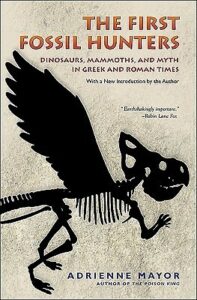
The First Fossil Hunters: Dinosaurs, Mammoths and Myth in Greek and Roman Times
Genres: History,
Non-fiction,
Science Pages: 400
Rating: 
Synopsis: Griffins, Cyclopes, Monsters, and Giants--these fabulous creatures of classical mythology continue to live in the modern imagination through the vivid accounts that have come down to us from the ancient Greeks and Romans. But what if these beings were more than merely fictions? What if monstrous creatures once roamed the earth in the very places where their legends first arose? This is the arresting and original thesis that Adrienne Mayor explores in The First Fossil Hunters. Through careful research and meticulous documentation, she convincingly shows that many of the giants and monsters of myth did have a basis in fact -- in the enormous bones of long-extinct species that were once abundant in the lands of the Greeks and Romans.
I really enjoyed this exploration and analysis of what the ancient Greeks and Romans thought of ancient fossils that they found and clearly noticed, collected and wondered about; the idea that they were “too big to be noticed” never sat right with me, even though it did seem weird that mostly the major philosophers didn’t comment on the subject (despite that well-known commentary on seashells demonstrating the presence of a long-lost sea in a given location).
I think that sometimes Mayor does go beyond her evidence — we just can’t be that certain, though she lays out some good evidence that tales of the existence of gryphons could’ve been sparked, in Greece, by second-hand travellers’ tales. I found that aspect of her discussion a bit thin, because there’s stuff in Greek mythology that is equally well or better explained by someone making stuff up.
That said, her discussion of “heroes’ bones” makes a lot of sense, and I do think it’s likely that stuff in Greek mythology references aspects of the world the Greeks didn’t understand, or didn’t properly understand anyway.
Rating: 4/5
Tags: Adrienne Mayor, book reviews, books, history, non-fiction, science













